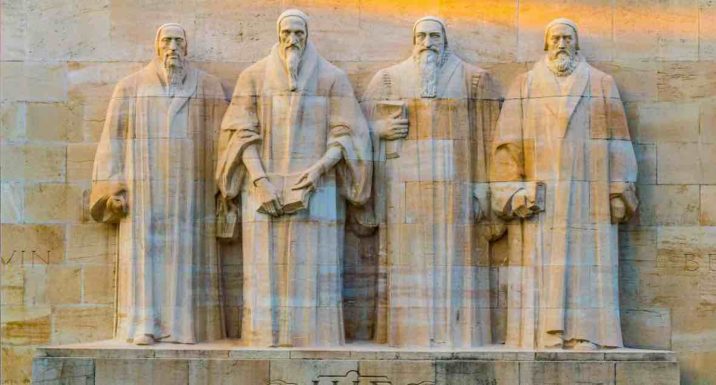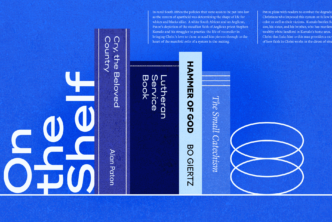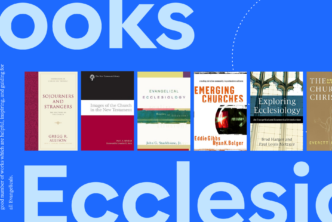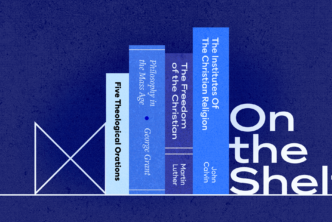Why were John Calvin’s writings more popular than one of Martin Luther’s disciples, Martin Bucer?
In this video excerpt from the Mobile Ed course Understanding the Protestant Reformation: Precursors and Legacy, Gerald L. Bray, author of Doing Theology with the Reformers, compares John Calvin’s background with Martin Luther’s to offer an answer.
Video transcript
Martin Luther was a pioneer. He was the one who shook the Church to its foundations by questioning the very basis on which it had taught and preached for centuries. And, of course, central to this was what he saw as the message of the Bible: that the just shall live by faith and, as he said, by faith alone.
Luther’s lectures on Galatians
Luther himself was a professor of New Testament, and so he lectured on Galatians, for example. And we have two lectures of his (lecture series)—one, which he wrote at the beginning of the Reformation, and another which he wrote about 15 years or so later.
And it’s very interesting to compare these, because in the first of these—which came out in 1519, only two years after the Reformation began—Luther is very critical of the fathers of the Church, of the tradition which he had learned. He says, “These people did not understand the Bible, not just because of their allegorizing and things like that, but because they didn’t fully understand the relationship between the law and the gospel, between sin and salvation.”
Luther’s commentaries
Later on in his life, Luther conceived the idea of writing commentaries on the whole of the Bible, and he started off with Genesis. Luther’s style was to lecture. He was a university professor, and people would take his lectures down. His commentaries on Galatians, for example, are really lecture notes made by his students. They put it all together, and Luther looked at it. And he said, “Yeah, that’s basically what I said,” and they were published and printed as a result. And he did the same with Genesis.
But it was so late in his life when he started that he never finished; he never really got beyond Genesis. He was a busy man with a lot to do, and he tended to react to situations as they developed. And so he never really had the time, the leisure, that he needed to sit down and work out his theology and his biblical interpretation in a consistent and coherent and systematic way.
John Calvin: following Luther’s footsteps
For this, we have to wait until the next generation: John Calvin, in particular. Now, Calvin, today, is often regarded as someone who stands in contrast to Martin Luther, and certainly, they were very different people. But having said that, we need to remember that Calvin saw himself as a disciple of Luther. He recognized that Luther had blazed the trail which he was going to follow.
And Calvin, because he was a very different kind of person—because he had a very different upbringing and training and so on—was able to fill in gaps that Luther, for various reasons, never fully addressed.
Calvin’s conversion
Calvin had never been a monk. He was not a priest. He’d never been ordained or anything like that in the Church. Like Luther, he came from a middle-class family, but his parents wanted him to be a lawyer, and he trained. He studied law, but it was while he was studying law in Paris that he met with followers of Luther and was converted to Protestantism, to justification by faith alone.
Fleeing persecution
But because this was a very unpopular idea in Paris at the time—and the Protestants who were there were actually causing trouble in the city and in the church and so on—and the king was out to get them, Calvin realized that he had to get out of town. So he ran away, really, from Paris in the dead of the night. He went first to the south of France, then he went to Italy. He traveled around. His aim, really, was to go to Germany if he could and in particular to the city of Strasbourg. Strasbourg is now in France, but at that time it was in Germany. And the person there that he wanted to meet and study with was a man called Martin Bucer—Martin Bucer, who was one of Luther’s earliest disciples.
John Calvin sidetracked to Geneva
That was his aim. But on his way from Italy to Strasbourg, he had to pass through the city of Geneva. And Geneva had just thrown out its bishop, its Catholic bishop, and adopted a form of the Protestant Reformation. But the man who led that—a man called [Guillaume] Farel—did not see himself as a very intellectual person, and he was looking for somebody who could be a teacher for the newly reformed church.
And when Calvin turned up—although he was still a very young man—Farel said, “This is the person who is going to change Geneva. This is the person who’s going to teach us what the Reformation is all about.” Calvin had no intention of staying there, but Farel threatened him. He said, “You know, God has told me that you must stay here, and if you try to get away, I shall shut the city gates and force you to stay.”
Well, Calvin didn’t really have anywhere to go. He wanted to go to Strasbourg, but he didn’t have any introductions there or anything like that. So to make a long and short of it, he stayed in Geneva and began to write theology. Calvin was self-taught in this way. He never studied it at a university; he just taught himself. But he had a legal background, of course, and this helped him organize and systematize his thinking.
Calvin in Strasbourg
Well, Calvin was young and enthusiastic and a bit extreme, and before long, the people of Geneva got fed up with him and threw him out. When that happened, Calvin reverted to his original plan and made his way to Strasbourg, where he became an assistant to Martin Bucer. And it was Bucer who taught him theology, who taught him biblical exposition and exegesis and so on. So Calvin learned his method, he learned his understanding of Scripture from Bucer.
Martin Bucer’s style
Well, you may ask yourself, “How is it then, that today we read Calvin—everybody knows about Calvin—but not many people ever read Bucer?” Well, the reason for this is simple. Bucer never used one word when 10 would do. He just talked on and on and on, and his writings are extremely difficult to read. If a subject came up in his lectures that he wanted to talk about, he would just drop whatever he was doing and talk about that. So he digressed an awful lot. He included all sorts of things in his writings that weren’t really relevant to the subject, making it extremely hard for other people to follow him.
John Calvin was not like that. Calvin was organized. Calvin put things in boxes and labeled them so that you knew what was going on. And because of this, his writings were read. People understood. They knew where they were. They could follow what he was saying. And so, Calvin, in spite of himself, you might say, became the great teacher of the Reformation—the great organizer of what we would now call Protestant thought.
Following Chobham and Lombard
Where did this sense of organization come from? Well, it came from medieval thinkers like Thomas of Chobham. It came from people like Peter Lombard. Men who had systematized medieval thinking in their day. Calvin took over the method and filled it with different content. Instead of lectio (the reading of Scripture) and disputatio (the argumentation) and then praedicatio (the preaching), Calvin recycled these ideas as exegesis, exposition, and application.
And he sat down deliberately to write things that would correspond to those three categories. With the result that we have his commentaries (that’s his exegesis), we have his Institutes, his systematic theology (that’s his exposition), and we have his sermons (the application, the way in which his theology was communicated to people).
And Calvin did all this together. He held these things together in harmony. He connected the dots, if you like, across the whole range of theology. And because of this, his work has survived and become a model for subsequent generations.
***
Learn more about Martin Luther, John Calvin, and the Protestant Reformation in Understanding the Protestant Reformation: Precursors and Legacy course.







